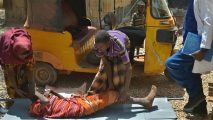Privacy Overview
This website uses cookies so that we can provide you with the best user experience possible. Cookie information is stored in your browser and performs functions such as recognising you when you return to our website and helping our team to understand which sections of the website you find most interesting and useful.


















24, May 2019
Cameroonian scientist champions African-led research 0
For Professor Torimiro, her research journey started years ago in the rainforests of Cameroon where she observed how hunter-gatherers live in close proximity to animals. At the time, she was among the first Cameroonian scientists to study zoonoses — disease or infections that are transmissible from animals to humans.
After years of study and postdoctoral research in clinical biochemistry and applied molecular biology in Nigeria, the United Kingdom and the United States of America, she returned to her country Cameroon, to support the national health system, teach and train health workers, and research infectious diseases that pose a risk to women and children.
From an assistant researcher to senior scientist
Since her return home in the 1990s, Professor Torimiro has helped create four health research institutions in Cameroon.
As Chair of the Department of Biochemistry at the University of Yaoundé I, she is a key figure in building academic capacities in molecular biology in her country and shaping Cameroon’s next generation of scientists. The research carried out by her students cuts across the use of molecular techniques to identify disease-associated genes to AIDS, hepatitis B, cancer, diabetes, fibroids and cardiovascular diseases.
“Research output drives health policy and therefore patient management and care. In other words, responsible conduct in research yields reliable and accurate data that could be used for policy change,” she explains.
Professor Torimiro says that Cameroonian scientists are increasingly able to conduct research to international standards, thanks to better access to tools, facilities and training.
“Since I returned to Cameroon in 2005, I have done all my laboratory work in Cameroon without having to take a single specimen to Europe or the USA. This is a giant step in terms of capacity-building and retaining talents in Africa.”
Research that responds to health challenges
Professor Torimiro is driven by an interest in operational research because “research output, especially in low- and middle-income countries, is only useful and meaningful if it responds to the health challenges of the population,” she says.
While HIV diagnosis is routinely performed in health facilities in her country, early diagnosis and quality control remain a challenge. That is why she supports system-wide improvements.
She is proud to have participated in a multi-disciplinary research group dealing with early infant diagnosis of HIV infection of children born to HIV-positive mothers and was instrumental to the creation of the national programme on this work, a key component of the National AIDS Treatment Programme. She later built capacities among health workers through international seminars on good clinical laboratory practice in the management of HIV/AIDS and co-infection of AIDS and hepatitis B patients.
“I wanted to transfer technical know-how, skills and competencies in research to gather evidence from populations in Cameroon that would make policy change possible in the diagnosis and treatment of HIV/AIDS.”
Professor Torimiro also leads a group of physicians, biologists, public health experts, career scientists and policymakers (including from Cameroon, Zimbabwe and the United Kingdom) to research hepatitis B in pregnant and breastfeeding women and its impact on mother and child health. The aim is to improve cost-effective early diagnosis of hepatitis B infection among infants born to hepatitis B-infected mothers.
Women supporting women
Ever since her very first grant back in 1994, Professor Torimiro has dedicated herself to addressing the problems of AIDS, cancers and hepatitis among poor women in rural areas of Cameroon.
For her outstanding achievements in maternal health, she received in 1999 the Award for Women’s Health from the Commonwealth.
“I personally sponsored many screening campaigns for cervical and breast cancer, as well as free screening for HIV, hepatitis B and hepatitis C,” she says.
This initiative was supported by national authorities and in particular the Ministry of Women’s Empowerment and the Family, and involves various women’s associations in Cameroon. She also trains and mentors junior female scientists in health research.
“I was and still am motivated to study how viruses move from a pregnant woman to her fetus and the differential clinical outcomes for the infant,” she says, confirming that her work aims to help women suffering from sexually transmitted diseases (syphilis, gonorrhea, HIV and hepatitis B).
Professor Torimiro says she has seen a big change in the success of treating sexually transmitted diseases among rural women in her country. More women are assertive in addressing sexually transmitted infections and are committed to engage in addressing them.
What more needs to be done? Integrate early diagnosis of other bloodborne pathogens (such as hepatitis B virus that can be transmitted from mother-to-child) among pregnant women into routine antenatal care services, and for free.
Source: WHO